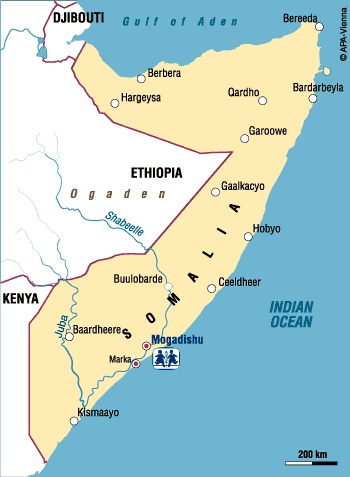Somali pirates live high life when not on high seas
 Mogadishu - They drive flashy cars, throw extravagant parties in their massive houses, talk loudly into the latest mobile phones and take only the most beautiful young women as their wives.
Mogadishu - They drive flashy cars, throw extravagant parties in their massive houses, talk loudly into the latest mobile phones and take only the most beautiful young women as their wives.
This may seem like a description of any number of bling-bling rap artists, but it also applies to Somali pirates, who are swiftly becoming the Horn of Africa nation's nouveau riche.
"They live a high-profile life - driving luxury vehicles, using fancy mobiles and laptops, living in big, decorated houses, marrying beautiful women," says Dahir Salaad Musse, a businessman in the port town of Bosasso in the semi-autonomous northern region of Puntland.
Piracy in Somalia has its roots in a movement of fishermen who banded together in the 1990s to prevent illegal fishing and the dumping of toxic waste off their shores.
While the hijackers still maintain this is their primary motivation, piracy has changed into a highly lucrative industry as shipping companies cough up increasingly hefty ransoms for the release of their ships.
In particular, the business has snowballed over the last few years as young men, seeing the lavish lifestyles of their peers, flock to get their slice of the cake.
The East African Seafarers' Assistance Programme says there are now well over 1,000 pirates patrolling the Gulf of Aden, compared to just over 100 in 2005.
As a consequence of what is Somalia's only growth industry, several pirate havens have sprung up in Puntland.
Settlements such as Eyl, Garowe and Harardhere are becoming boomtowns - at least compared to the rest of Somalia, where a bloody insurgency, drought and rising food and fuel prices have left millions dependent on food aid.
It is little wonder that the residents of these towns have a rosy view of the pirates.
"Pirates are the best customers I have because they don't bother bargaining like the others - they buy expensive shirts, trousers and aftershave," says Mohamed Ali Yarow, who owns a menswear store in Garowe. "Girls like to date pirates because they give them good money."
Puntland officials, while trying to play down the popularity of the pirates, also admit that flashing the cash helps the gangs achieve acceptance.
"They are not so popular in the big towns, but they have real economic and social influence in some villages," says Bile Mohamoud Qabowsade, senior adviser to Puntland President Adde Muse.
This year has been the worst on record for acts of piracy off Somalia.
Almost 40 ships have been hijacked this year. The crowning glory came over the weekend when a Saudi supertanker, the Sirius Star, was seized while carrying 100 million dollars of crude oil.
The tanker is now anchored off Haradhere as ransom negotiations take place and the pirates seem well aware they have hit the jackpot.
They are reportedly demanding 25 million dollars for its release - a serious step up from the roughly 2 million dollars that has become the norm, at least this year.
Although they are unlikely to receive such a hefty ransom, it shows the ambition of the pirates, who are become increasingly daring despite the presence of growing numbers of international warships in the Gulf of Aden.
There have been suggestions from some quarters that the pirates have links to Islamist insurgents in south and central Somalia, but Ali Jamaal, a pirate based in Eyl, says that the gangs have neither religious nor political links with any group.
This is good news for the hostages, who often spend months cooped up onboard while negotiations take place. They are treated well during their captivity, with the pirates often setting up special kitchens onshore to cook western meals.
"We give the best consideration to our hostages because what we want is to earn good money from them," says Jamaal. "We have to take care of their health and their meals."
The strategy of taking care of the captives has paid dividends. According to a recent report by London-based think tank Chatham House, shipping companies have lashed out 30 million dollars in ransoms to Somali pirates this year.
Like any good entrepreneur, the pirates plough some of the profits back into the business, buying weapons and GPS systems for use on the motherships that launch speedboats out to board undefended vessels.
But there is plenty of cash left over for life's little luxuries. As a result, the pirates rarely fight amongst themselves - no small feat in a society plagued by clan rivalries.
To ease any possibly tensions, the pirates have a system in place to ensure equitable distribution of ransom funds.
"There is an agreed percentage for sharing the money... some goes to those who seized the ship ... some to the defenders on shore," says Jamaal.
Even though the warships are becoming an increasing threat, with an Indian frigate sinking a pirate mothership earlier this week and governments worldwide demanding firmer action, the rewards for the pirates still far outweigh the risks.
As long as this remains the case and Somalia remains a country of limited opportunities, the pirates are unlikely to abandon their nefarious seafaring activities. (dpa)